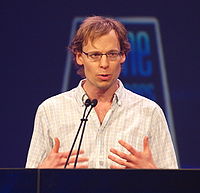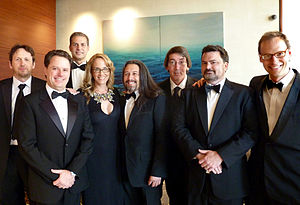- Chris Hecker
-
Chris Hecker 
Chris Hecker at the Game Developers Conference in 2010Born 1970
St. Louis, Missouri, USAOccupation Former Technology Fellow at Maxis[1] Christopher Bryan Hecker is a video game programmer and commentator.
Contents
Biography
Hecker was a student at the Parsons School of Design in New York City, studying the fine arts towards work as an illustrator. An article in Byte Magazine sold him on programming and he dropped out of school to begin work on graphics and games.
Hecker worked at Microsoft for three years, where he created and led the WinG API project for the Windows operating system. The success of WinG in allowing game development on Windows led directly to the inception of DirectX, the now-standard game development platform for Windows.[2]
After completing WinG, Hecker moved to the entertainment division and wrote the rendering engine for the real-time globe display in Encarta World Atlas. He then left Microsoft in 1995 to start Definition Six,[3] a Seattle, Washington based games and computer graphics consulting company that was later moved to Oakland, California.
Definition Six focused on the development of physics technology for games,[4] and lobbied for the OpenGL standard for graphics display.[5] The company produced a tech demo [1] but did not ship a commercial title. During this time, Hecker spent many years working independently on a game based on the sport of rock climbing[6][7] that was never completed.
In 2004, Hecker took a job with Maxis, working with Will Wright on Spore.[8][9] He led the development of many of the key technologies in that title, including the core creature tesselation, painting, skinning, and animation technologies.
For many years Hecker was Editor-At-Large of Game Developer Magazine, and also serves on the editorial board for the Journal of Graphics Tools.[10] He currently sits on the advisory board for the Game Developers Conference,[11] and is the member with the longest tenure of those currently serving.
In 2006, Hecker was awarded the Community Contribution award at the Game Developers Choice Awards at the 2006 Game Developer Conference.[12][13]
He was recently laid off from Maxis.[1] Hecker is currently working on an "indie" game called SpyParty.
Articles
 Hecker and other game developers at a BAFTA event in Los Angeles in July 2011. From left: Rod Humble, Louis Castle, David Perry, Brenda Brathwaite, John Romero, Will Wright, Tim Schafer, Chris Hecker.
Hecker and other game developers at a BAFTA event in Los Angeles in July 2011. From left: Rod Humble, Louis Castle, David Perry, Brenda Brathwaite, John Romero, Will Wright, Tim Schafer, Chris Hecker.
During his time at Microsoft and Definition Six, Hecker wrote an influential programming column for Game Developer Magazine.
Two series of articles from this column still serve today as standard references on their respective subjects. The initial series was the first complete synthesis of perspectively-correct texture mapping, and formed the mathematical basis for many important game rasterizers, including Michael Abrash's seminal rasterizer for the landmark 3D title Quake.[14]
The second was a series on rigid body dynamics simulation for games [2], complete with an extensive bibliography of rigid body dynamics resources [3], which has become a standard web reference thereof. The articles were part of a general push by Hecker to incorporate more interactive physics in games,[15] which at the time in 1996 rarely featured any physical simulation.
In the summer of 1997, Hecker stepped down as author of the regular column to focus on game development full-time.
Indie game advocacy
In many interviews and speaking engagements, Hecker has lobbied heavily for the development of an independent games movement.
Lamenting the lack of innovation in gameplay, he has pushed for alternative markets and models for small-scale video game production.[16] In 2002, with a few of his friends (largely Looking Glass Studios veterans), Hecker co-founded the successful Indie Game Jam.[17]
In addition to directly leading to the creation of at least one commercial title,[18] the Indie Game Jam inspired others to create their own local game jams worldwide, such as the similarly named Boston Game Jam and Toronto Game Jam .[19][20]
Wii comments
At the 2007 Game Developers Conference, Chris stated that the Wii game console was a "piece of shit" in reference to Wii's low computational power in comparison to competing consoles and that the Wii was hardly better than two GameCubes stuck together with duct tape.[21][22] He later issued a public apology, saying his earlier comments went too far, and were "no longer thought provoking, just inflammatory" and that "everyone at Nintendo is passionate at making great games."[23] At the 2008 Game Developer Conference, Chris received the first ever Duct Tape Award as a joke from Eric Zimmerman during the developer's rant session.[24]
Spore: contributions and controversy
Hecker's research and development effort on Spore is widely regarded as a major step forward in procedural character animation and rendering. Part of the technology he developed while working on the project was later selected for publication in the SIGGRAPH 2008 Transactions on Graphics conference proceedings,[25] and became a featured presentation at that conference.[26] An interview with Will Wright later claimed that Hecker's work on Spore had advanced the state of the art in procedural animation by several years.[27]
After Spore's release in late 2008, some players considered comments by Hecker made in Seed Magazine[28] to indicate that he had been primarily responsible for the game's lack of hard scientific backing.[29] This interpretation of the interview was discredited by Spore lead designer Will Wright [30] and Spore producer Lucy Bradshaw.[31]
References
- ^ a b "Elvis Has Left the Building". http://chrishecker.com/Elvis_Has_Left_The_Building.
- ^ Colayco, Bob (2000-03-07). "Alex St. John Interview". firingsquad.com. http://www.firingsquad.com/features/alexstjohn/. Retrieved 2008-10-30.
- ^ "Computer Graphics in the Seattle Area". 2004-04-08. http://seattle.siggraph.org/seacg.html. Retrieved 2008-10-31.
- ^ "The Experimental Gameplay Workshop". http://www.experimental-gameplay.org/info.html. Retrieved 2008-10-31.
- ^ Brown, Peter (1997-07-07). "Microsoft asked to support OpenGL". Reed Business Information, Inc.. http://findarticles.com/p/articles/mi_m0EKF/is_n2175_v43/ai_19584088. Retrieved 2008-10-31.
- ^ "Experimental Gameplay Workshop 2002". http://experimental-gameplay.org/2002/index.html. Retrieved 2008-10-30.
- ^ "Experimental Gameplay Workshop 2003". http://experimental-gameplay.org/2003/index.html. Retrieved 2008-10-31.
- ^ Takahashi, Dean (2008-06-11). "An interview with EA Maxis’ Lucy Bradshaw on the making of Spore". Matt Marshall. http://venturebeat.com/2008/06/11/an-interview-with-ea-maxis-lucy-bradshaw-on-the-making-of-spore/. Retrieved 2008-10-31.
- ^ Siegel, Scott Jon (2006-11-13). "Joystiq interviews Spore's Chaim Gingold and Chris Hecker". AOL Games. http://www.joystiq.com/2006/11/13/joystiq-interviews-spores-chaim-gingold-and-chris-hecker/. Retrieved 2008-10-31.
- ^ McGuire, Morgan. "A Game Developer's Perspective of SIGGRAPH 2001". FlipCode.com. http://www.flipcode.com/misc/siggraph2001.shtml. Retrieved 2008-10-31.
- ^ "The GDC Advisory Board". Think Services, a Division of United Business Media. http://gdconf.com/aboutgdc/advisoryboard.html. Retrieved 2008-10-31.
- ^ "Special Honors Recognize RPG Pioneers, Chris Hecker and Founders of Harmonix at 6th Annual Game Developers Choice Awards". PR Newswire. 2006-03-16. http://www.prnewswire.com/cgi-bin/stories.pl?ACCT=104&STORY=/www/story/03-16-2006/0004321505&EDATE=. Retrieved 2008-10-31.
- ^ "Choice awards to Hecker, Harmonix, others". CNET Networks, Inc., a CBS Company. 2006-03-17. http://www.gamespot.com/news/6146126.html. Retrieved 2008-10-31.
- ^ Abrash, Michael (2008-05). "Quake's Hidden-Surface Removal". Dr. Dobb's Sourcebook. http://www.whisqu.se/per/docs/math18.htm. Retrieved 2008-11-04.[dead link]
- ^ Frauenfelder, Mark. "Smash Hits". Wired Magazine. http://www.wired.com/wired/archive/9.08/physics_pr.html. Retrieved 2008-11-04.
- ^ Hall, Justin; Tracy Fullerton, Christopher Swain, Steven Hoffman (2004). Game Design Workshop: Designing, Prototyping, and Playtesting Games. Gama Network Series. CMP Books. pp. 438–441. ISBN 1578202221. http://www.tar.hu/gamedesign/gamedesign0127.html.
- ^ Adams, Ernest (2002-05-15). "Technology Inspires Creativity: Indie Game Jam Inverts Dogma 2001". CMP Media LLC. http://www.gamasutra.com/features/20020531/adams_01.htm. Retrieved 2008-10-31.
- ^ "Experimental Gameplay Workshop: Success Stories and Influences". http://experimental-gameplay.org/goodstuff.html.
- ^ "Boston Game Jam". http://www.bostongamejam.com/. Retrieved 2008-11-04..
- ^ "Toronto Game Jam". http://www.tojam.ca/details/history.asp. Retrieved 2008-11-04.
- ^ Rosmarin, Rachel (2007-03-08). "No News From Nintendo". Forbes.com. http://www.forbes.com/technology/2007/03/08/nintendo-wii-gdc-tech-cx_rr_0308game.html. Retrieved 2008-10-31.
- ^ Hatfield, Daemon (2007-03-07). "GDC 2007: "The Wii is a Piece of $#&%!"". IGN Entertainment. http://au.wii.ign.com/articles/771/771051p1.html. Retrieved 2008-10-31.
- ^ Chen, Jason (2007-03-08). "Spore Developer Chris Hecker Apologizes For Calling the Wii a "Piece of Shit"". kotaku.com. http://kotaku.com/gaming/wii/spore-developer-chris-hecker-apologizes-for-calling-the-wii-a-piece-of-shit-242822.php. Retrieved 2008-10-31.
- ^ Boyer, Brandon (2008-02-22). "GDC: Game Designers Rant On Making Games That Matter". gamasutra.com. http://www.gamasutra.com/php-bin/news_index.php?story=17587. Retrieved 2008-10-31.
- ^ "SIGGRAPH '08: ACM SIGGRAPH 2008 papers". ACM. 2008. ISSN 0730-0301. http://portal.acm.org/toc.cfm?id=1399504&coll=GUIDE&dl=GUIDE&type=proceeding&idx=SERIES382&part=series&WantType=Proceedings&title=SIGGRAPH.
- ^ "Spore Experts Share Animation Techniques at SIGGRAPH 2008". ACM. 2008-08-01. http://www.siggraph.org/s2008/media/releases/release16.php. Retrieved 2008-11-02.
- ^ Will Wright (2008). [The Making of Spore] (DVD). United States: Electronic Arts.
- ^ Robertson, Margaret (2008-09-08). "The Creation Simulation". Seed Media Group, LLC. http://seedmagazine.com/news/2008/09/the_creation_simulation.php. Retrieved 2008-11-04.
- ^ "We Found Who to Tar and Feather!". 2008-10-14. http://forum.spore.com/jforum/posts/list/8555.page. Retrieved 2008-11-04.
- ^ "Post from Will Wright Regarding Cute vs. Science". 2008-11-04. http://forum.spore.com/jforum/posts/list/11211.page. Retrieved 2008-11-04.
- ^ "Re:We Found Who to Tar and Feather!". 2008-10-30. http://forum.spore.com/jforum/posts/list/165/8555.page#128787. Retrieved 2008-11-04.
External links
Categories:- 1970 births
- Living people
- Microsoft employees
- Video game programmers
Wikimedia Foundation. 2010.
